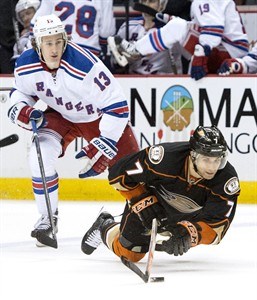
The Ducks' Andrew Cogliano controls the puck as he falls to the ground during a game in Los Angeles on Wednesday night Jan. 7, 2014. (AP Photo/The Orange County Register, Kyusung Gong)
Republished January 08, 2015 - 6:29 PM
Original Publication Date January 08, 2015 - 3:25 PM
ST. PAUL, Minn. - The NHL's motion to dismiss a class-action lawsuit brought by former players over concussion-related injuries was heard in court Thursday, and the federal judge assigned to the case said she saw legal strength in the arguments from both sides.
"I think it's a very close call, to be honest," U.S. District Judge Susan Richard Nelson said, near the end of the five-hour hearing.
Nelson didn't make a ruling. She gave no timetable for her decision.
The former players have been seeking unspecified financial damages and NHL-funded medical monitoring for neurological disorders, alleging the league had the knowledge and resources to better prevent head trauma, failed to properly warn players of such risks and promoted violent play that led to their injuries.
The case is similar to that of the former NFL players who received at least $765 million through a tentative settlement to cover nearly 20,000 players over 65 years.
This combination of several lawsuits by more than 200 former NHL players was formally filed in October. As a class-action complaint, the litigation effectively covers the estimated 5,000 living former NHL players. Dan LaCouture, Michael Peluso, Gary Leeman, Bernie Nicholls, David Christian and Reed Larson are the former players serving as six class representatives.
Attorneys for the NHL made two arguments for dismissal of the lawsuit: pre-emption and statute of limitations. The gist is that the league's collective bargaining agreement with the players should pre-empt the claim, subjecting the dispute to the National Labor Relations Board, and that a tort claim such as this cannot be made past the six-year window for raising them.
Lawyers for the players countered that the CBA no longer applies to retired players, who didn't know at the time of their injuries how they would eventually affect them.
In making the point for dismissal on the statute of limitations, NHL attorney John Beisner referred to expansive details on concussion-related trouble for the players that took up significant space in the original complaint. The league's argument is that the players can't pick and choose by claiming post-career injuries without alluding to the long-ago dates those first hits to the head occurred.
"What is the 'aha' event here that starts the clock running again?" Beisner said.
In arguing against the statute of limitations for the players and their claims, attorney Mark Bradford said the issue isn't simply about concussions that occurred immediately after hits to the head on the ice. It's about permanent neurological problems that arose later, he said.
The lawsuit blames the NHL for taking no action to reduce the number and severity of concussions during a study period from 1997 to 2004. The penalty for targeting a player's head wasn't instituted until 2010.
The league's argument to that is the information on head trauma is available to the public. It wrote previously that players should have been able to "put two and two together" to realize the risks. Bradford argued for the players that the message, then, is they should have double-checked the NHL's work in the concussions study.
NHL attorney Joseph Baumgarten argued for the CBA precedence. If players suffered a concussion during their careers, Baumgarten said, they were covered then by the CBA even though retirees aren't. No examination of the league-player relationship, he said, can take place without recognizing the CBA.
Stephen Grygiel, an attorney for the players, argued that retirees have no post-career leverage in negotiating CBA terms. Since brain injuries came to light later, coverage of their concussions by the CBA was moot.
"They could not go to the union then or seek representation for a claim they didn't know they had," Grygiel said.
Nelson was the judge who temporarily lifted the NFL lockout in 2011, ruling against that league.
She asked the most questions Thursday regarding the dispute about whether or not the CBA should take precedence in this case. At one point, when Baumgarten referred to the NFL Players Association's past decertification in order to bring forward a class-action lawsuit, Nelson said, "I know a little bit about that."
News from © The Associated Press, 2015